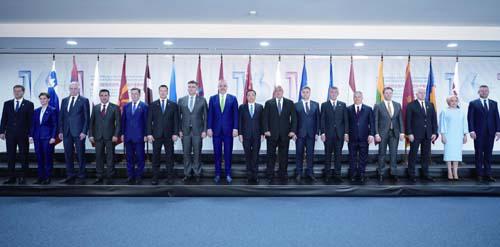Consolidating Ties
2018-08-06ByWenQing
By Wen Qing


Sometimes, rules are there to be broken and for government leaders, there is no exception. During a meeting between visiting Chinese Premier Li Keqiang and Bulgarian Prime Minister Boyko Borissov in Sofia on July 6, away from formalities, Borissov stood up not long after the talks had started, and, with a map of Bulgaria in his hand, sat beside Li pointing out places in need of infrastructure and expressing his hope that Chinese enterprises will participate in the construction. Other infrastructure projects were also mentioned, including a nuclear power plant. The moment caught the attention of the media.
The episode demonstrates Bulgarias trust in Chinas equipment manufacturing and infrastructure construction capability, said Liu Zuokui, a researcher with the Institute of European Studies of the Chinese Academy of Social Sciences.
Bulgaria was the fi rst leg of Lis European trip from July 5 to 11. He also visited Germany in addition to attending the sev- enth leaders meeting of China and the Central and Eastern European countries(CEECs) in Sofi a.
As U.S. trade protectionism darkens the future of global economic growth and generates concern worldwide, Li reiterated Chinas commitment to opening up and safeguarding the values of free trade as well as expressing his hopes for enhanced cooperation with Chinas European partners during the visit.
Pragmatic cooperation
Li was the first Chinese premier to visit Bulgaria in 18 years. According to a joint communique released after the meeting between Li and Borissov, bilateral cooperation is set to cover several distinct areas. In politics, the two countries will take the opportunity of the 70th anniversary of the establishment of their diplomatic ties in 2019 to consolidate political trust. They also agreed to open their markets wider to each others products, with China set to import more quality agricultural products from Bulgaria.
Collaboration between China and Bulgaria represents in miniature the broader cooperation between China and the 16 CEECs which include Albania, Bosnia and Herzegovina, Bulgaria, Croatia, the Czech Republic, Estonia, Hungary, Latvia, Lithuania, Macedonia, the Republic of Montenegro, Poland, Romania, Serbia, Slovakia and Slovenia.
During the six years since the 16+1 mechanism was created in 2012, the volume of trade between China and the CEECs has grown to almost $70 billion from $40 billion, with average annual growth of 6.5 percent. The two sides have also seen the steady growth of two-way investment.
Cooperation between China and the CEECs is also expanding to more areas. For example, Li and Borissov jointly inaugurated an agricultural demonstration zone between China and the CEECs on July 7, signifying collaboration in agriculture as well as infrastructure.
The seventh leaders meeting of China and the CEECs on July 7 was themed Deepening Open and Pragmatic Cooperation for Inclusive Prosperity. Participating leaders agreed to further enhance cooperation in various areas. They also adopted a guideline for China-CEEC cooperation and witnessed the signing of more than 20 documents on cooperative programs.
Li put forward suggestions focused on tapping cooperation potential such as more CEEC participation in the construction of industrial parks according to their own advantages. He also proposed more investment and fi nancing channels for 16+1 cooperation, and invited CEEC fi nancial institutions to launch branch offi ces in China.
Chinas goal of enhanced pragmatic cooperation was met with enthusiasm by the CEECs. Romanian Prime Minister Viorica Dancila said during her meeting with Li that Romania would work with China to deepen cooperation in interconnectivity, fi nance and aviation.
Latvian Prime Minister Māris Ku?inskis also expressed his hopes of enhancing cooperation with China in scientifi c and technological innovation as well as in research and development.
The CEECs have expressed a strong desire to boost cooperation with China due to their complementary nature in certain economic areas, Li Weiwei, an associate researcher with the China Institute of International Studies (CIIS), told Beijing Review.
Compared with Western European nations, the CEECs lag behind in infrastructure and they need financial and technological impetus and assistance to address such gaps. However, investment from Western Europe has been insuffi cient, especially following the global financial crisis. Therefore, Chinas investment, wealth of experience in infrastructure construction and strong manufacturing capabilities have become more attractive to the CEECs, Li Weiwei added.
Unequivocally opposed
In response to doubts about China-CEEC cooperation, the Chinese premier stressed on July 7 that it is a misunderstanding that 16+1 cooperation is dividing Europe. “The 16+1 cooperation is not an exclusive clique, but an open and transparent platform. It will benefit European integration… A united, stable and prosperous EU and a strong euro conform to the fundamental interests of China,” he added.
Borissov said he believes that 16+1 cooperation can help some less developed nations catch up with other European countries, which is also conducive to EU development.
Hungarian Prime Minister Viktor Orban said that 16+1 cooperation benefits the CEECs and all of Europe. “It is fair to say that it is a platform that is in the interest of Europe.”
In Germany, Premier Li co-chaired the fifth round of intergovernmental consultations with German Chancellor Angela Merkel, in which both sides agreed to unequivocally oppose protectionism and safeguard the multilateral rules-based system of free trade to promote strong, sustainable and balanced global economic growth.
Moreover, Li reiterated Chinas commitment to proactively expanding opening up and accelerating the transformation of its domestic consumption and industrial upgrading, which provides great prospects for German companies looking to export highend equipment and quality services. Merkel said that Germany opposes trade wars and advocates rules-based free trade, while speaking highly of Chinas measures to improve its market environment and open its fi nancial sector.
China and Germany have long enjoyed a close economic and trade relationship. In recent years, both sides have committed to expanding cooperation to new areas, in which emerging industries such as artificial intelligence, new-energy vehicles and selfdriving technologies are the priority, Li Weiwei from the CIIS said.
According to Li Weiwei, Merkels visit to Shenzhen, a leading innovation hub in south Chinas Guangdong Province, in May, showed her interest in the development of Chinas technology industry, with Premier Li also calling for the alignment of innovation strategies between China and Germany in these sectors.
Moreover, in a joint statement released after the intergovernmental consultations, the two sides agreed that scientifi c research and innovation was an important pillar of bilateral cooperation and invited their scientists to participate more in both cutting-edge and basic research.
Bilateral support from the government can accelerate cooperation for enterprises in such industries. On July 9, Chinese vehicle battery manufacturer Contemporary Amperex Technology Ltd. (CATL) signed an agreement with the Thuringian State Government to invest $282 million in the construction of Germanys largest lithium battery production plant.
The investment is of great significance not only for CATL itself, but also for the state and the new-energy automobile industry in Europe, Thuringian Economics Minister Wolfgang Tiefensee said.
